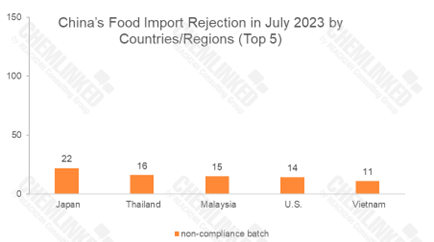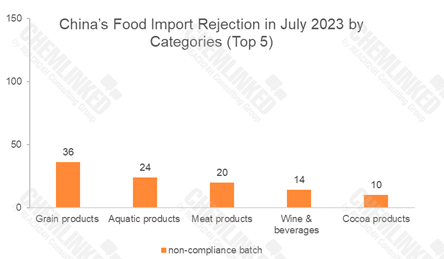Seven batches of solid beverages and four batches of health supplements were rejected by China Customs in July.
On August 19, 2023, General Administration of Customs of China (GACC) published the list of non-compliant food products in July of 2023. 138 batches of imported food from 29 countries/regions were rejected.
Most non-compliant imported food in July came from Japan (16.0%, mostly snacks), followed by Thailand (11.6%, mostly grain products) and Malaysia (10.9%, mostly solid beverages and grain products). The major reasons for import rejection were:
l Unqualified labeling (32.6%)
l Failed sensory test (10.9%)
l Discrepancy between cargo and certificate (10.1%)
l Lack of inspection & quarantine permit (9.4%)
l Exceeding the use of food additives/nutritional fortification substances (9.4%)


Noteworthy Products
1. Solid beverages
Seven batches of solid beverages from Malaysia were rejected for unqualified labeling, all of which are instant coffee powder products. For solid beverages, they must comply with every aspect including labeling requirements stated in GB 7101-2022 Beverage. Besides, it is recommended to fulfill more detailed requirements stated in GB/T 29602-2013 Solid Beverages. In July, China proposed the updated version of this recommendatory standard. Key changes cover definition, product categories, technical requirements, labels and packaging.
2. Health supplements
Four batches of health supplements, one from Japan and three from the U.S., failed to pass customs clearance due to qualified labeling and improper use of food nutritional fortifiers. Despite that these products are recognized as health supplements in their exporting countries, due to the complex market access of health supplements in China, many enterprises tend to export these products to China as normal food products, e.g., pressed candy, instead of health supplements. In this case, these products shall comply with standards applied to normal food products instead of health supplements. But of course, the products can be imported as health supplements under the premise that they meet the standards for health supplements.
Source: GACC and Chemlinked
Note: This article is compiled by Antion. Please indicate the source for reprint.